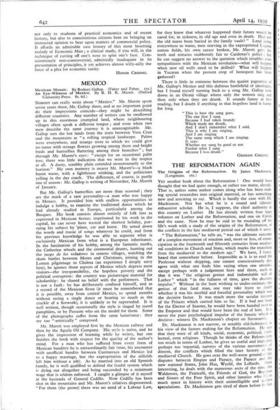THE REFORMATION AGAIN
The Origins of the Reformation. By James Mackinnon. (Longmans. i6s.)
YET another book about the Reformation ! One would have thought that we had quite enough, or rather too many, already. That is, unless some author comes along who has been mak- ing special researches into original material, or has something new and arresting to say. Which is hardly the case with Dr. Mackinnon. Not but what he is a sound and (almost) exhaustive scholar. He is, I suppose, the chief authority in this country on Luther. He has already written four large volumes on Luther and the Reformation, and one on Calvin and the same. Now he may be said to be rounding off his life's work with a study of the origins of the Reformation, of the conflicts in the late mediaeval period out of which it arose.
" The Reformation," he tells us, " was the ultimate outcome of a complex movement of reaction and, more or less, of eman- cipation in the fourteenth and fifteenth centuries from mediae- val conditions in Church and State, which marks the transition from the mediaeval to the modern age." We have, I fancy. heard that somewhere before. Impossible as it is to read the Professor without skipping, one cannot conscientiously dis- agree with what one finds him saying when one attends ; except perhaps with a judgement here and there, such as that it was " the religious genius and indomitable will of Luther " which " in the fullness of time, gave the decisive impulse." Without in the least wishing to under-estimate the genius of that fatal man, one may take leave to doubt whether it was his morbid and forceful personality which was the decisive factor. It was much more the secular interest of the Princes which carried him so far. If it had not been for the Elector of Saxony, he would have been handed over to the Emperor and that would have been the end of him. It is never the pure psychological impulse of the fanatic which is decisive : witness Dr. Mackinnon's chapter on Savonarola.
Dr. Mackinnon is not narrow, or notably old-fashioned, in his view of the factors making for the Reformation. He sees that they were of all kinds, social, economic, political, intel- lectual, even religious. Though he thinks of the Reformation too much in terms of Luther, he gives us useful and impartial, perhaps too impartial, surveys of the various movements of dissent, the conflicts which filled the later history of the mediaeval Church. He goes over the well-worn ground of the disputes between Empire and Papacy, the Papacy and the new national States, John Hus, Wyclif, the Lollards. More interesting, he deals with the numerous sects of the time, the Waldenses, the Fraticelli, the Friends of God, the Brethren and Sisters of the Free Spirit, and other lunatics who fi:1 so much space in history with their unintelligible and useless speculations. Dr. Mackinnon gets tired of them before h: has finished with them, as I, even before I have begun. He says, mildly, of Meister Eckhart, of whom so many Germans used to make so much fuss in the days of the Weimar Republic: "His doctrinairism is apt at times to become tiresome to the more rational and less mystical reader." It is illuminating to regard Luther as coming at the end of this tradition of Ger- man mystics and fanatics.
The upshot of Dr. Mackinnon's book, then, is that the Reformation was not very• surprising. Nor was it—something of the sort was to be expected from all the precursors and signs of the previous centuries. Dr. Mackinnon makes out his case, it must be agreed, and as a text-book his work will no doubt be found convenient and useful.
A. L. ROWSE.







































 Previous page
Previous page